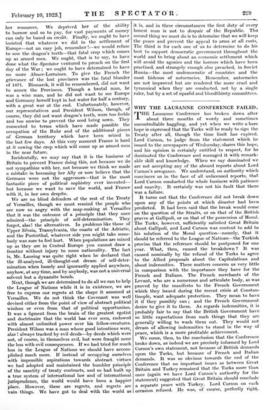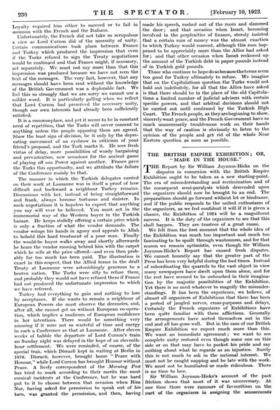WHY THE LAUSANNE CONFERENCE FAILED. T HE Lausanne Conference has broken
down after about three months of wordy and sometimes uncontrollable haggling, and yet when we write a bare hope is expressed that the Turks will be ready to sign the Treaty after all, though the time limit has expired. Lord Curzon, to judge from the statement which he issued to the newspapers of Wednesday, shares this hope, and his opinion is certainly entitled to respect, for he dominated the Conference and managed it with remark- able skill and knowledge. When we say dominated we are not accepting any of the absurd reports about Lord Curzon's arrogance. We understand, on authority which convinces us in the face of all unlicensed reports, that Lord Curzon conducted the whole business with patience and suavity. It certainly was not his fault that there was a failure. THE Lausanne Conference has broken down after about three months of wordy and sometimes uncontrollable haggling, and yet when we write a bare hope is expressed that the Turks will be ready to sign the Treaty after all, though the time limit has expired. Lord Curzon, to judge from the statement which he issued to the newspapers of Wednesday, shares this hope, and his opinion is certainly entitled to respect, for he dominated the Conference and managed it with remark- able skill and knowledge. When we say dominated we are not accepting any of the absurd reports about Lord Curzon's arrogance. We understand, on authority which convinces us in the face of all unlicensed reports, that Lord Curzon conducted the whole business with patience and suavity. It certainly was not his fault that there was a failure.
It turns out that the Conference did not break down upon any of the points at which disaster had been predicted. It had been said that the break would come on the question of the Straits, or on that of the British graves at Gallipoli, or on that of the possession of Mosul. The Turks, however, sufficiently satisfied Great Britain about Gallipoli, and Lord Curzon was content to add to his solution of the Mosul question—namely, that it should be referred to the League of Nations—the Turkish proviso that the reference should be postponed for one year. What, then, caused the breakdown ? It was caused nominally by the refusal of the Turks to agree to the Allied proposals about the Capitulations and about indemnities. These matters concern us very little in comparison with the importance they have for the French and Italians. The French merchants of the Levant, who are a numerous and articulate body, as was proved by the manifesto to the French Government which they issued during the recent crisis at Constan- tinople, want adequate protection. They mean to have it if they possibly can ; and the French Government desire to give it to them. As regards indemnities, it is probably fair to say that the British Government have so little expectations from such things that they are generally willing to wash them out. They would not dream of allowing indemnities to stand in the way of peace, which is a more profitable achievement.
We come, then, to the conclusion that the Conference broke down, as indeed we are precisely informed by Lord Curzon's own statement, not because of British demands upon the Turks, but because of French and Italian demands. It was so obvious towards the end of the Conference that no important issues as between Great Britain and Turkey remained that the Turks more than once (again we have Lord Curzon's authority for the statement) suggested that Great Britain should conclude a separate peace with Turkey. Lord Curzon on each occasion refused. He was, of course, perfectly right. Loyalty required him either to succeed or to fail in common with the French and the Italians.
Unfortunately, the French did not take so scrupulous a view as Lord. Curzon did of the necessity of unity. Certain communications. took place between France and Turkey which produced the impression that even if the Turks refused to sign the Treaty negotiations, would be continued and that France might, if necessary, act separately. We must not say more than that this impression was produced because we have not seen the text of the .messages, The very fact, however, that any messages should have been sent without the knowledge of the British Government was a deplorable fact. We feel this so strongly that we are sorry we cannot use a milder word. It is particularly galling when we reflect that Lord Curzon had preserved the necessary unity, though our own interests had already been sufficiently satisfied.
It is a commonplace, and yet it seems to be in constant need of repetition, that the Turks will never consent to anything unless the people opposing them are agreed. Show the least sign of division, be it only by the depre- cating movement of an eyebrow in criticism of your friend's proposal, and the Turk marks it. He sees fresh vistas of delay, more possibilities of wordy bargaining and prevarication, new occasions for the ancient game of playing off one Power against another. France gave the Turks this opportunity, and we attribute the failure of the Conference mainly to that.
The manner in which the Turkish delegates carried on their work at Lausanne was in itself a proof of how- difficult and backward a neighbour Turkey remains. Discussions with her, instead of being straightforward and frank, always become tortuous and sinister. In such negotiations it is hopeless to expect that anything you say will ever be- believed. You must act in the immemorial way of the Western buyer in the Turkish bazaar. He keeps stolidly offering a certain price which is only a fraction of what the vendor demands. The vendor wrings his- hands in agony and appeals to Allah to behold' this hard treatment of a poor man. Finally the would-be buyer walks' away and shortly afterwards he hears the vendor running behind him with the carpet which he sells at the price offered—and even then prob- ably far- too much has been paid. The illustration is exact in this respect, that the Allied terms in the draft Treaty at Lausanne were astonishingly generous to a beaten nation. The Turks were silly to refuse them, and probably they would not have refused them if France had' not produced the unfortunate impression to which we have referred.
Turkey had everything to gain and nothing' to lose by acceptance. If she wants to remain a neighbour of European Powers she must observe the decencies, and; after all, she cannot get on without European co-opera- tion, which implies a modicum of European confidence in her intentions. There would be something very amusing if it were not so wasteful of time and energy in such. a Conference as- that at Lausanne. After eleven weeks of babble the departure of Lord' Curzon's train on Sunday night was delayed in the hope of an eleventh- hour settlement. We were reminded, of course, of the special trail. which Disraeli kept in waiting at Berlin in 1878. Disraeli, however, brought home " Peace with Honour," while Lord Curzon has brought Honour' without Peace. A lively correspondent of the Morning Post has tried to mark according • to their merits the most comical- incidents at the Conference, but he was hard put to it to choose between that occasion when Riza Nur, having asked for permission to speak out. of his turn, was granted the permission, and then, having made. his speech, rushed out of the room and slammed the door ; and that occasion when Ismet, becoming involved in the perplexities . of finance, sternly insisted that a certain sum of money was: the utmost exaction to which Turkey would consent, although this, sum hap- pened: to be appreciably more than the Allies had asked for:; and that other occasion when Ismet reckoned up the, amount of the Turkish debt in paper pounds instead of. in Turkish gold pounds.
Those who continue to hope do sobecausetheterms seem too_ good for Turkey. ultimately to refuse. We imagine that on the Capitulations- question the Turks would not hold out. indefinitely, for all that, the Allies, have asked is that there should be in the place of the. old Capitula- tions. a. limited number of judicial advisers with certain specific powers, and that arbitral decisions should not- be carried out until confirmed by the Turkish High Court. The French people, as they arebeginning to show, sincerely:want peace, and the French Government have so much unnecessarily troublesome work on their hands that the way of caution is. obviously to listen to the .opinion. of the people and get rid of: the whole Near Eastern question as. soon as possible.



































































 Previous page
Previous page